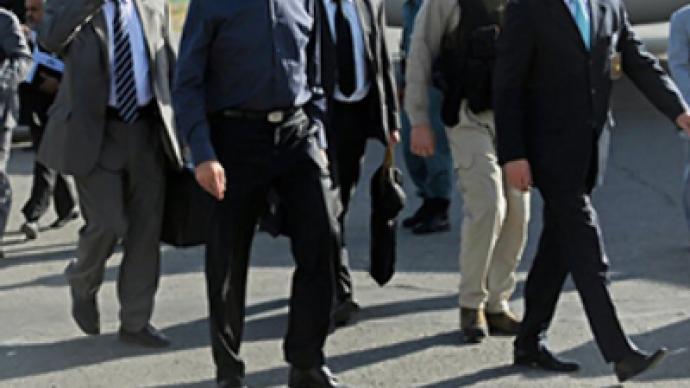Afghanistan dreams of a NATO-free future

With the battle against Taliban forces intensifying, an international conference assembled in Kabul where the future of the embattled country was discussed.
After experiencing nearly a decade of US-led hostilities against Taliban forces that has witnessed the death of hundreds of civilians and soldiers alike, Afghanistan is eager to assume control over its internal security apparatus and free itself from the yoke of foreign intervention.
“We face a vicious common enemy that violates every Islamic and international norm to break our unity of effort,” Afghan President Hamid Karzai said during his opening comments at the international conference, which assembled together some 70 foreign ministers for the historic meeting. “They would like nothing better than to create uncertainty, to force our publics to doubt our state power and our determination.”
But despite the mounting aggressiveness of the “vicious enemy,” Karzai declared that he wants Afghanistan to be in full control of its security forces in four years, a time frame that many analysts say is too ambitious.
“I am committed to having the ability by 2014 to reach the level of strength and ability and capacity in our own forces to provide for our own security,” Karzai declared at a joint news conference with United Nations Secretary General Ban Ki-moon at the end of the conference.
The Afghan leader, however, was a bit vague as to how Afghanistan’s national forces would successfully relieve NATO’s 150,000 troops now engaged in fierce battles with Taliban forces in the country.
“Our goal is to transform the three organs of our national security forces into trusted national institutions dedicated to fulfilling their constitutional duty of ensuring the integrity and security of our country,” Karzai told the delegates, adding that a commission would determine which of the 34 provinces are ready for Afghan forces to assume control from 2011 onwards.
NATO Secretary General Anders Fogh Rasmussen emphasized that the transition to any sort of Afghan-led security, however, would be based on “conditions, not calendars.”
“Our mission will end when – but only when – the Afghans are able to maintain security on their own,” he said.
US Secretary of State Hillary Clinton, fresh from a visit to neighboring Pakistan, said that Washington was prepared to hand over security operations to Afghanistan’s military and police forces starting as early as July 2011.
“The July 2011 date captures both our sense of urgency and the strength of our resolve,” Clinton said. “The transition process is too important to push off indefinitely, but this date is the start of a new phase, not the end of our involvement.”
The Secretary of State, however, left plenty of room for interpretation when she said “We have no intention of abandoning our long term mission of achieving the kind of Afghanistan that President Karzai set forth in his speech.”
Manouchehr Mottaki, Iranian Foreign Minister, countered Clinton’s appraisal with a brisk reality check, reminding the delegates of the great sacrifices that have already been made on behalf of the international coalition.
“Despite the increase in military forces, the security situation is getting more dangerous,” Mottaki said. “It is hard to envision a future in which the situation improves. According to official statistics, insecurity has increased significantly since last year.”
Indeed, almost 8,000 coalition troops have lost their lives fighting in Afghanistan, with almost twice as many wounded. The month of June ranked as one of the deadliest months of the nine-year-old war with 103 troop fatalities; July is on track to be an equally deadly month with 54 NATO fatalities, including 39 Americans already reported.
These grim statistics came amidst a high-profile scandal that saw Stanley A. McChrystal, former Commander of US Forces in Afghanistan, tender his resignation following an interview with a US magazine in which the now unemployed General voiced his displeasure with the way the Obama administration was managing the war. He was replaced by General David Petraeus.
But not all of the issues focused on the military aspect of the war. Kabul has long complained that the vast majority of the money being funneled into the country is tightly controlled by foreign governments, who then bankroll projects supervised by foreign companies. Only about 20% of foreign aid is placed in government coffers.
Clinton acknowledged the problem, saying “We have to do a better job of trying to more carefully channel and monitor our own aid,” while adding that Kabul needed to address issues related to corruption inside of the government.
Russia continues support
Russian Foreign Minister Sergey Lavrov told his fellow delegates in Kabul that a scheduled August meeting of the presidents of Russia, Afghanistan, Pakistan and Tajikistan in the Russian city of Sochi will help develop cooperation in the region.
“The development of efficient regional cooperation in order to settle Afghanistan’s problems is a priority,” the Russian foreign minister said, while alluding to the work of a regional security organization. “The Shanghai Cooperation Organization (SCO), within the framework of which the SCO-Afghanistan contact group was set up, makes exactly such a contribution.”
Lavrov then mentioned the importance of recognizing Afghanistan’s future "neutral status," which would preclude any sort of permanent foreign military presence in a harsh, unmerciful land that has been rightly dubbed the "graveyard of empires."
“The restoration of the neutral status of Afghanistan is designed to become one of the key factors of creating an atmosphere of good-neighborly relations and cooperation in the region,” the Russian minister said. “We expect that this idea will be supported by the Afghan people. The presidents of Russia and the US have already come out in favor of it.”
Meanwhile, Russia will continue working with its international partners to equip Afghan security forces with the necessary military equipment, Lavrov told the delegates.
“We intend to help the stabilization force created in Afghanistan with the central role of the UN by ensuring transit through the Russian territory of cargo and international forces personnel,” Lavrov said. “We are also working with our partners on additional measures to equip the Afghan army and police. We are expanding cooperation in the training of personnel of Afghan law enforcement agencies.”
Lavrov stressed, however, that the wrapping up of the military mission by the International Security Force should adhere to the original mandate set down by the UN Security Council [The International Security Assistance Force is a NATO-led security mission in Afghanistan established by the United Nations Security Council on 20 December 2001 by Resolution 1386 as envisaged by the Bonn Agreement].
“I mean the suppression of the terrorism threat; formation of Afghan security services capable of ensuring national security; stopping drug trafficking; achieving national reconciliation; creating efficient government institutions; restoring economic potential and developing democratic institutions,” he explained.
Lavrov also emphasized the need for the “settlement of the situation not only in Afghanistan, but also in the Afghanistan-Pakistan border zone.”
“We support the efforts of Kabul and Islamabad aimed at the development of closer cooperation in the fight against the terrorism threat emanating from this zone,” Lavrov added.
Meanwhile, it was also announced that Russia is actively working to reinvigorate Afghanistan's economy, much of which depends on the heroin trade, in which a disproportionate amount finds its ways onto Russia's streets.
This year, Russia cancelled an $891 million debt owed by Afghanistan, which brings the total debt cancelled by Russia to $12 billion.












